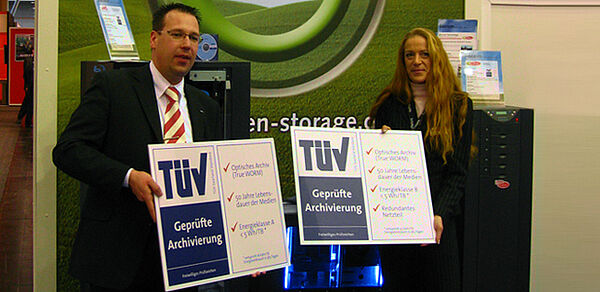The test scenario was designed as far as possible in favor of the RAID system: For example, the largest commercially available disks (1TB) were used to reduce the number of "power-hungry" motors. The power consumption of the pure hard disk array was also measured and the results were not increased by additional controllers/consumers (e.g. as a NAS system). In addition, mirroring, which would be necessary to protect against data loss, was not used and necessary backup procedures or cooling measures, which are indispensable in real use, were not considered.
In case of multiple failures of hard disks, there is a high risk that the stored data will be irretrievably lost. This can be attributed to the fact that the data-carrying disks are directly connected to the mechanical parts - if the mechanics fail, the entire disk including the data is usually destroyed. In some cases, data can be recovered, but this is a costly and time-consuming process. Assuming an average life span of three to four years for hard disks, several failures are pre-programmed. A migration and complete replacement of the disks every three to four years can be expected. In contrast, Blu-ray Discs have a lifetime of up to 50 years if stored correctly. Climatic chamber tests even showed a much longer life span. A migration, for example from DVD to Blu-ray Discs, can be performed in the same library.
The results speak for themselves:
Even when the optical libraries (with 30TB) are running at full speed, the power consumption is still significantly lower than that of the 10 TB RAID system in standby mode. Even without data access, the hard disks continue to rotate constantly and consume power. With optical libraries, on the other hand, power consumption drops as read and write accesses decrease. This fact makes optical systems predestined for use in long-term archiving, where data must be stored for long periods of time without constant access.
A further advantage results from the physical immutability of the data. Once written, the data on the Blu-ray Disc is in an unchangeable state - as if set in stone. This property is referred to as TrueWORM. Hard disk data can be changed as often as desired, which makes revision security physically impossible. The only solution is an expensive and proprietary encryption software, which only the manufacturer can decrypt - in this case, however, you are actually giving your sensitive data into the hands of a third party.
TÜV certificate for the most energy-efficient archiving systems on the storage market
After the measurements had been taken, the optical systems were examined more closely and certified by the TÜV. Storage systems can therefore be divided by TÜV into five classes from A+ to D, with A being the most energy-efficient archiving hardware currently measured by TÜV worldwide. Class A+ is currently not achieved by any system and is an incentive for manufacturers to make further optimizations in class A. The JVC library achieves Class A and is thus the top performer for archives without redundant power supplies.
The Disc Library is equipped with two redundant power supply units for special reliability and thus achieves energy efficiency class B and is also the best in the class "Archive with redundant power supply units".
The bare Raid 5 system (without security mirroring, without the usual cooling, without controller or other "auxiliary hardware" used with disk archives) is classified in the worst class "D" with its hunger for energy.
Conclusion:
Hard disks are indispensable for online storage with many simultaneous read and write accesses, but they are not suitable for archiving purposes due to their high consumption and inadequate service life. Even when taking into account the optimal conditions for RAID and not including necessary infrastructure (such as external cooling), optical systems consume between 65% and 90% less energy than RAID systems, depending on load.
To get the most out of your data center to meet requirements such as security, performance, cost and energy efficiency, it makes sense to use "the right technologies in the right place" or a suitable technology mix to meet the various storage system requirements.
